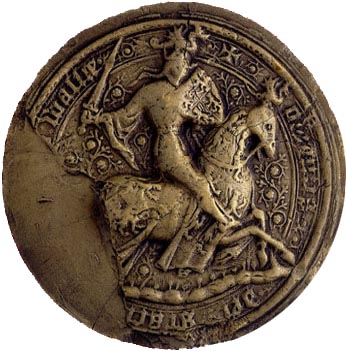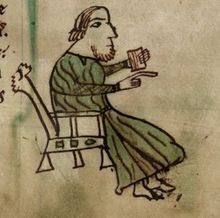Chapter 15: Now is the Winter of Our Discontent
Much of the summer of 1408 passed by as a period of calm beneath the English sun, but that did not mean that nothing happened. Each faction took the opportunity to try and rebuild and reorganise their forces for the next stage of war, the Lancasters in the south-east and the West Country were undoubtedly under the most pressure of all the factions, having been pushed back and forced to endure a string of defeats under the leadership of first Henry IV and then Thomas I which had resulted in the north being all but lost and the capture of Thomas I himself by the Mortimers. Thus, as the campaign season began in the late spring of 1408, they were hoping that the tripartite leadership of John of Bedford, Henry IV’s third son, and John and Thomas Beaufort, the Earls of Somerset and Exeter, who were serving as counsellors to their nephew, would guide the Lancaster cause back from the brink. The Percys, meanwhile, were going evermore confident in their position, even to the point of arrogance, as the north fell ever increasingly under their dominion, although Liverpool frustratingly continued to stand strong with the support of the Stanleys, vehement Lancaster supporters particularly after the seizure of their lands in Swydd Caer by Glyndŵr, something which they blamed both the Percys and the Mortimers for, from their new estates on the Isle of Man. Last but not least, the Mortimers in the Midlands had enjoyed a fruitful time over the summer as they expanded their power base in the Midlands rapidly and, more importantly, peacefully as the great influence of Warwick in the region allowed the acquisition of first Worcester, whose castle formed part of the Beauchamp estates, and then Kidderminster and the towns of Bromsgrove and Pershore in quick succession. In addition, both the Lancasters and Percys had spent the summer engaged in some minor attacks, which were manifested as naval attacks from the Isle of Man for the Lancasters and forays southwards into the Midlands from Yorkshire.
 The arms of John Stanley of the Isle of Man
The arms of John Stanley of the Isle of Man
This persistence on the part of the Percys was the key driver in John of Bedford’s decision to march his army north in a bid to retake the city of York, which had been held by the Percys since 1406 and served as the capital of their fledging kingdom in the north. As such, John of Bedford, accompanied by Thomas FitzAlan, 12th Earl of Arundel, marched northwards at the head of a significant Lancaster army in early August, whilst John and Thomas Beaufort, the Earls of Somerset and Exeter who now acted as counsellors to their nephew, remained in the south. Whilst John and his army marched northwards, the Mortimers, sensing an opportunity to march on London itself, assembled their forces and headed south across the river Avon and into the idyllic countryside of the Cotswold. The region, famous for its wool production, was rapidly overrun by the Mortimers and Sir Edmund and his men reached Cutteslowe, a heath a short way outside Oxford, in late August after a some minor clashes near Woodstock. At Cutteslowe, the Mortimer army encountered a significant Lancaster army, under the command of Richard de Vere, 11th Earl of Oxford, and the two armies drew up to face each other in battle lines on the heath. The two armies were unevenly matched, with the Mortimers holding the numerical advantage, and the battle began in earnest with the Mortimer army charging across the field and smashing into de Vere’s force, which was quickly overwhelmed by the Mortimers and driven from the field, with de Vere being among the dead left scattered across the heath.
 The arms of Richard de Vere, Earl of Oxford
The arms of Richard de Vere, Earl of Oxford
With de Vere killed, and much of the Oxford garrison with him, the Sir Edmund and his men advanced on Oxford itself and found the city gates wide open to welcome them, having been opened by the people of the university. With the city in Mortimer hands, Edmund I, the Mortimer King, moved to imitate the methods of John the Fearless, Duke of Burgundy, and build his support through demagoguery. With that in mind, he set out a series of promises for his reign, which included a reduction in taxes, the curbing of the powers of the monarch and, perhaps most importantly, the reaffirmation of Magna Carta, which still held a prominent position in the English political consciousness. Much like John the Fearless’ promises had done in France, the promises of Edmund I were designed to appeal to the people of the universities of England and the middle classes and so they did, with many of people of Oxford, both the city and the university, joining the Mortimer cause. Boosted by this support, the Mortimers moved on from Oxford to march down the Thames Valley on London with all the force that they could muster. By this time, however, John of Bedford had, unsurprisingly, heard of the Mortimers seizure of Oxford and turned his men back, having only fought the Percy forces once, at Lincoln where a small force that had strayed southwards was routed.
The Mortimers reached London first and had hoped to march into London unopposed, but found the city walls manned by Lancaster supporters led by John Talbot, Earl of Shrewsbury. As such, the Mortimer army set up camp at Runnymede in order to besiege the city. A few weeks into the siege, John of Bedford and his army arrived at Runnymede to fight the Mortimers, having been harassed and harangued by soldiers loyal to the Percys on their journey south, and arrayed themselves in battle lines opposite the Mortimer camp. The resulting Battle of Runnymede was fought on the 2nd October 1408 and was long and bloody, with hundreds of soldiers from both sides dying on the once beautiful meadows of the area. The battle was eventually won when Sir Edmund Mortimer, himself, led his knights in a charge against the Lancaster right wing, commanded by Thomas FitzAlan, Earl of Arundel. Arundel’s wing was smashed by the charge and, once the Mortimer infantry joined the Lancaster centre in fierce hand-to-hand fighting on the banks of the Thames, the Lancaster force was broken and John of Bedford fled the field. After the surrender of London several weeks later and the entry of the Mortimers into the city, John of Bedford was forced to flee England itself and sailed to France where he was taken in by the Orléanists, many of whom had favoured peace with England in the first place. As a result, the Beaufort brothers in the West Country promptly raised their standards in rebellion against the Mortimers and prepared to move on the Mortimer holdings in the western Midlands.
The seizure of London by the Mortimers in early November was a massive blow to the Lancasters as Edmund I was crowned King of England in Westminister Abbey on the 16th November 1408 with only the Beauforts standing strong in opposition in the West Country in the hope that John would return from France with Orléanist soldiers to back their cause. The Percys, meanwhile, were greatly enjoying the defeat of John of Bedford in the south and moved to take Liverpool at last. They besieged the city in early November and the city fell a month later to mark the low point of the winter of discontent for the Lancasters who were now on the verge of defeat.
_____________________
The War of Three Kings is more or less over for the Lancasters now, but they'll be a continuing thorn in the Mortimer side for a long time to come. As usual, please do comment and, more importantly, enjoy!






